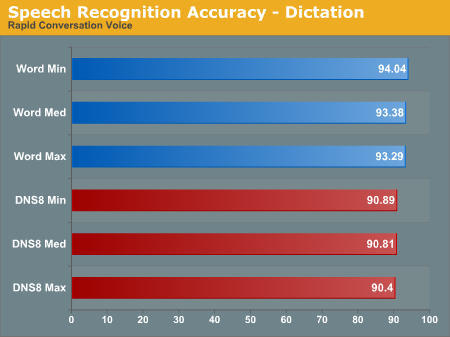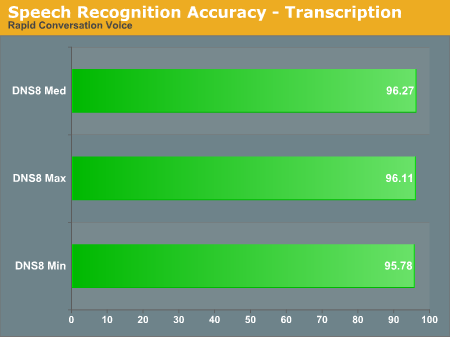Speech Recognition - Ready for Prime Time?
by Jarred Walton on April 21, 2006 9:00 AM EST- Posted in
- Smartphones
- Mobile
Speech Accuracy - Precise Dictation
Moving to a more typical speech pattern and not my stilted dictation voice, how do things change? First, this sound file is 1208 words and 8:11 in length. This is obviously a much more rapid delivery, typical of more casual conversation. At 147 wpm, this is faster than all but the best typists can achieve. The question is, how will the software deal with the faster delivery? We'll start with dictation mode again.
Dictation Accuracy

Accuracy drops several percent in both products, but DNS is clearly affected more. In fact, at just over 90% accuracy, there are enough errors that it's questionable whether or not you'd really be saving any time. In this particular instance, Microsoft's speech engine makes half as many mistakes. In a rather odd twist, both products also get more accurate as you turn their accuracy gauge down. It appears that with rapid text, the algorithms almost "overthink" the waveforms.
Transcription Accuracy

Switching to transcription mode, Dragon once again comes out on top. What's most likely happening is that Dragon is trying to determine whether or not you're issuing commands or dictating text, and it ends up wasting time that could be better spent analyzing your speech patterns. Basically, Dragon has a more complex user interface, and in straight rapid dictation this appears to be a handicap. Trascribing a WAV file shuts off many of the extras, so performance and accuracy improve substantially.
Moving to a more typical speech pattern and not my stilted dictation voice, how do things change? First, this sound file is 1208 words and 8:11 in length. This is obviously a much more rapid delivery, typical of more casual conversation. At 147 wpm, this is faster than all but the best typists can achieve. The question is, how will the software deal with the faster delivery? We'll start with dictation mode again.
Dictation Accuracy

Accuracy drops several percent in both products, but DNS is clearly affected more. In fact, at just over 90% accuracy, there are enough errors that it's questionable whether or not you'd really be saving any time. In this particular instance, Microsoft's speech engine makes half as many mistakes. In a rather odd twist, both products also get more accurate as you turn their accuracy gauge down. It appears that with rapid text, the algorithms almost "overthink" the waveforms.
Transcription Accuracy

Switching to transcription mode, Dragon once again comes out on top. What's most likely happening is that Dragon is trying to determine whether or not you're issuing commands or dictating text, and it ends up wasting time that could be better spent analyzing your speech patterns. Basically, Dragon has a more complex user interface, and in straight rapid dictation this appears to be a handicap. Trascribing a WAV file shuts off many of the extras, so performance and accuracy improve substantially.










38 Comments
View All Comments
Googer - Saturday, April 22, 2006 - link
BMW 7 series Speech recognition is about 50-75% accurate (my guess) and some users have more luck with it than others.Googer - Friday, April 21, 2006 - link
I think you should re-benchmark these on a system that is not overclocked. Overclocking may have contibuted to errouneous test results. It is possible that some of the benchmarks could have been better on a normal system. Also I am surprised this was not tested on a Intel Syststem. Prehaps one of the programs may benefit from the Netburst Architeture with or with out dual core.Also I would love to download the Dication and Normal Voice wav files, so I can understand the differance between them. Thanks for the article, it came in perfect time; Someone who is handicaped was asking me about this last night.
JarredWalton - Friday, April 21, 2006 - link
I'll see about putting up some MP3s of the wave files -- of course, that will open the door for all of you to make fun of how I speak. LOLIn case this wasn't entirely clear in article, this was all done on my system that I use every day for work. It's overclocked, and it's been that way for six months. I run stress tests (Folding at Home -- on both cores) all the time. I would be very surprised if the overclock has done anything to affect accuracy, especially considering that I did run some tests on a couple other systems that were not overclocked, and basically removed them from this article because they would have simply taken more time to put in the article, and they didn't give me any new information.
It's pretty obvious that neither of these algorithms benefit from multiple processing cores -- HyperThreading, dual core, SMP, whatever. I also wasn't sure how much interest there would be from people in this topic, but if a lot of people want to know how this runs on Intel systems I could go back and look at one. One thing worth noting is that SysMark 2004 does include Dragon NaturallySpeaking version 6.5 as one of the tests. Of course, the results are buried in the composite scores.
JarredWalton - Friday, April 21, 2006 - link
MP3 links available:http://www.anandtech.com/multimedia/showdoc.aspx?i...">http://www.anandtech.com/multimedia/showdoc.aspx?i...
Note that DNS only uses WAV files (AFAICT), but uploading 45MB WAV files seems pointless. Convert them to WAVs if you want to try them with Dragon.
Googer - Saturday, April 22, 2006 - link
Excellant job on the dictation/wav files, you are a very good reader and have a nice clear and concice voice. ;ThumbsUP)stelleg151 - Friday, April 21, 2006 - link
Cool article. I hope that voice recognition continues to improve, for I think it could be incredibly useful for areas like HTPC, or as you said messenging while doing other things (gaming).Zerhyn - Friday, April 21, 2006 - link
Have you ever tried out speech recognition and been underwhelmed? To you yearn to play the role of Scotty and call out..?
PrinceGaz - Friday, April 21, 2006 - link
Yes, that was the first thing I noticed before I even started reading the article. Maybe they used speech-recognition software to enter that.I think they should have an editor (or at least let another contributor read what others have written) who has to approve an article before it goes live as the current number of tyops is unforgiveable ;)
JarredWalton - Friday, April 21, 2006 - link
I'm doing my best to catch typos before anything goes live, but after being up all night trying to finish off this article, I went to post and realized I didn't have a title or intro. So, I put one in using Dragon, but my diction goes to put when I'm tired, as does my eyesight and proofing ability. One typo in a 44 word intro (I didn't proof/edit it at all) isn't too bad for the software. Bad for me? Maybe, but mistakes do happpen. :)johnsonx - Friday, April 21, 2006 - link
One nice thing about Dragon, despite the high CPU utilization shown in the article, is that it will run quite happily with very lowly systems. I have a customer who uses it all day long on PentiumIII-850's with only 512Mb RAM (the max for those particular systems). The heaviest user there recently upgraded to a low-end Sempron64 with a gig of RAM, and he says the overall system is far more responsive (of course), but Dragon's operation isn't radically better; it worked great on the PIII, and works great now.